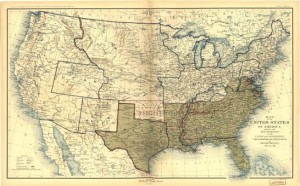 Revivals in the Confederate army camps and doctrinal debate among Baptists of the North offer two glimpses into Baptist life today.
Revivals in the Confederate army camps and doctrinal debate among Baptists of the North offer two glimpses into Baptist life today.
Today’s edition of Virginia Baptists’ Religious Herald reports that revival meetings within Confederate General Robert E. Lee‘s army have been going on for “fifty-five consecutive days and nights without regard to weather or other untoward circumstances.” This winter camp revival outbreak, according to eyewitnesses, began after the Confederate victory at the Battle of Fredericksburg and a display of the Northern Lights following that decisive December triumph. The revivals thus noted are destined to continue, in various displays and intensity, for almost two more years.
Meanwhile, on the Indiana homefront two Baptist pastors in the midst of a doctrinal disputation determine to air their disagreements in an open debate. The Rev. Joel Hume, pastor of the Regular Baptist Church in Posey County, and the Rev. Benoni Stinson, pastor of the General Baptist Church in Vanderburgh County, decide to debate in Owensville over the nature of the Atonement. A letter from Stinson seals the deal:
POSEYVILLE, IND., February 26, 1863.
ELDER B. STINSON:–
Dear Sir:– Yours of the 22nd instant came to hand this evening, which I have carefully read. I confess I can not see the necessity, or even the propriety, of my affirming what my negative of your proposition will as fully establish, as I shall be able to do. Nevertheless, let the matter remain as set forth in your last to me, at least until we meet, for I have no objections to the propositions as set forth by yourself, only, as I believe, we shall travel over the same ground twice. If we meet at all, I desire our propositions and arguments to cover all the grounds of difference between us, which I believe the two propositions named in my last would fully accomplish.
I have no objections to Owensville as the place for the discussion, and I would suggest Tuesday after the fourth Monday in March as the time to commence. You choose one Moderator and I one, and they choose their own President. The rules by which the discussion is to be governed can be agreed upon after we meet. If the debate is published, we should have a good stenographer in attendance every hour. If the suggestions here meet your approbation, please inform me immediately; if not, please inform me in what particular you wish them changed.
Yours, as ever,
JOEL HUME.
Hume soon writes back to declare the “arrangement all satisfactory,” and suggests moving the beginning of the debate to the last day of March, to which Stinson subsequently agrees.
The two gentlemen thus engage in a spirited debate over the nature of Christ’s death. At the end of five days of verbal sparring, the two men part ways, yet disagreeing over whether salvation of persons is entirely predetermined by God (Calvinism) or is predicated upon human free will (Arminianism).
When the two preachers part ways, neither doctrine nor the war have been settled. Hundreds are dying daily on battlefields or from war wounds, each passing from life to death and encountering for himself alone the mystery of salvation and damnation to which evangelists and preachers have spoken words apart from experience.
Sources: Religious Herald, February 26, 1863; “Hume-Stinson Debate on the Doctrine of Atonement” (link)


